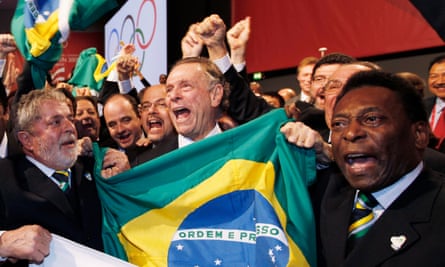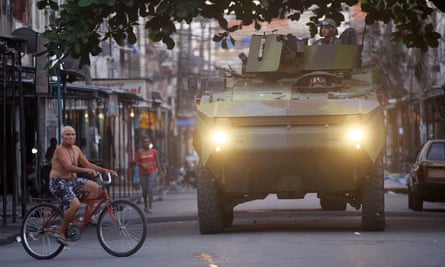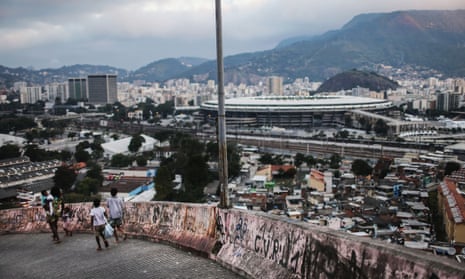As dusk falls over Copacabana beach, Ubira Santos, a 63-year-old sand sculptor, relaxes with a few friends on deckchairs in front of one of his distinctive creations.
A handful of extraordinarily callipygian sand-women lie prone, as if sunning their backs, beneath a gnome-sized statue of Christ the Redeemer, with one reaching up to embrace his feet.
Back in 2013, during the pope’s visit to Rio de Janeiro, when millions of Catholics gathered on the beach, Santos covered up their outsize bottoms, “out of respect”, he says. For the Olympics next month, he is planning to add a boxer and a couple of wrestlers to the sculpture, but he has no plans to abandon his sand goddesses.
“They’re the stars of the show,” he says. Santos is looking forward to the Games and the hope of earning more money from the tourists who typically drop a couple of reais in an upturned plastic bottle in return for a photo, but his expectations are tempered by the reality of life in the Olympic city. “Things are pretty bad here in Brazil at the moment,” he says. “I’m just hoping for a lot of tourists, and that things improve.”
That sentiment is widely shared. Crisis-hit Brazil desperately needs an Olympic lift. After two shockingly awful years of economic decline and political turmoil, it is close to a depression in more ways than one.
The happy-go-lucky, funny, sunny stereotype of Cariocas – as Rio’s residents are known – was always more marketing ploy than reality. But even the veneer of a joyful city has been challenged by a flood of gloomy news.
Since Brazil was knocked out of the World Cup it hosted in 2014 with a dire 1-7 semi-final defeat to Germany, the national mood has gone from bad to worse. The economy has declined or stagnated in eight of the past 10 quarters. With GDP having shrunk by close to a tenth – the steepest decline since the 1930s – the recession is virtually a depression. Once challenging Britain and France for fifth place in world output rankings, Brazil is now in danger of slipping out of the top 10, having fallen behind India and Italy.

The political landscape is, if anything, even grimmer. In 2009, when Brazil won the right to host the Olympics, it was ruled by a popular Workers party government headed by a president – Luiz Inácio Lula da Silva – whose approval ratings were among the highest in the world.
Today the country is in the midst of an impeachment battle. Lula’s suspended successor – Dilma Rousseff – could be thrown out of office the week after the closing ceremony. Her replacement, interim president Michel Temer, has approval ratings in the low teens and has already lost three of his cabinet ministers to the corruption scandal at the state oil giant Petrobras.
Few sympathise with them or the dozens of other senators, deputies and business executives who have been ensnared in the Lava Jato (Car Wash) investigation, but the scandal – along with a collapse in oil and other commodity prices – has torn through society like a tornado, leaving devastation in its path.
Rio-based Petrobras was the biggest company in Latin America and the biggest employer in Brazil. But in little more than two years 61% of its 276,600 employees have lost their jobs. The region’s biggest construction company, Odebrecht, which is also part of the Lava Jato probe, has also slashed its workforce. The knock-on effect has hurt other industries. The unemployment rate is at a record 11.4%.
Add in resurgent crime, budget cuts, a Zika epidemic and pollution concerns, and there is little wonder that Rio mayor Eduardo Paes is already lamenting the Olympics as a “lost opportunity”. But while they will not show the best of Brazil, there are still hopes that they could nudge the country over the worst.
The Olympics have partly mitigated the impact of the recession. Rio city remains far better off than most areas of Brazil. The organisers say they will spend 39.1bn reais (£9.1bn) on the event and related infrastructure, 58% of which is from private money. The construction of roads, stadiums, a metro extension and hotels has created jobs and kept money circulating around the economy. Tourism is also expecting a boost from the 10,500 athletes and up to 500,000 foreign visitors expected for the event.
But even with these advantages Rio is in crisis. The state government – which based its budget on a forecast of an oil price of $100 a barrel – has effectively declared itself bankrupt now that its main revenue source, Petrobras, is lucky to get half that amount. Last month acting governor Francisco Dornelles described the situation as a “financial calamity” that undermined Rio’s ability to meets its Olympic and Paralympic commitments. For Dr Luiz Ainbinder, a famous Rio psychologist, the optimism that marked Rio’s successful bid to host the Games in 2009 has been replaced by a profound, if realistic, pessimism.
“Cariocas are a very welcoming people, and throughout the Olympics there will be a kind of truce,” he says. “But when the Games are over there will be a real sense of anger. The works will come to an end, and a lot of people will be left unemployed.”
Even before the sporting circus departs, some are already feeling its absence. With most of the building work now complete, the construction workers’ union says it is receiving notices of 100 layoffs each day.
The hunger for jobs was evident last week at a recruitment event for temporary Olympic hires. Although the doors opened at 9am, the queue of prospective workers began forming at 4am. Among the first to arrive was Rosilene Leandro da Silva, who has not worked since she was laid off from her job at a garage shop. “I have to pay the rent and support two daughters. I really need to get a job today,” she told reporters.
Karen Scavacini, a psychologist, said the number of depression cases she was seeing had risen “scarily” and suicide cases were also on the increase because of worries about work and money. She cited the case of a teacher who committed suicide last week after not being paid for four months.
Against this backdrop, she said it was hard for people to get into the spirit of the Olympics. “There has been so much disbelief in the government and there is a lack of hope that things will get better. This is a stronger feeling than the excitement about the Games,” she said.
Like many others, she hopes this will change once the sporting spectacle begins. However, the opening ceremony on 5 August will not be the lavish festival seen in recent Games due to budget restraints. The creative director, Fernando Meirelles, estimates Brazil will spend a tenth of the £80m that Danny Boyle was able to tap for the opening of London 2012. “I would be ashamed to waste what London spent in a country where we need sanitation – where education needs money. So I’m very glad we’re not spending money like crazy,” said Meirelles, who has promised a show that will be powerful but not flashy.
There had been fears that budget cuts would also hit security. After a decade of improvement in the crime rate, the past two years have seen an up-tick in cases of murder and mugging. A programme to “pacify” favela communities that were previously run by drug traffickers has been scaled back. Several visiting athletes have been robbed. After police salaries were delayed by the Rio state government last month, striking officers greeted arrivals at the main international airport with a banner declaring their inability to protect visitors underneath the pithy slogan “Welcome to Hell!”
Since then, however, the federal government has stepped in with an emergency loan to cover salary payments and the deployment of about 20,000 military personnel to protect the main tourist areas and Olympic sites. This should dampen down crime in these areas, though human rights groups such as Amnesty International and Human Rights Watch warn it may also lead to an increase in violence by security forces. In the wake of the attacks in France, terrorism is also a major concern, particularly given reported threats by Isis against the Rio Olympics.
Far more than Zika, super-bacteria or pollution, this is the major concern of local people. According to a recent poll by the O Globo newspaper, 85% of Rio residents see “lack of security” as the biggest threat to the Games. The survey also showed a degree of apathy about the event. Only 49% were in favour of the Olympics, although most – 61% – felt it would be successful.
But there is also anger and frustration in the more deprived, less tourist-friendly areas of the city. In the Complexo da Maré, a massive network of favelas that sits alongside the Linha Vermelha, the main highway from the international airport to the city centre, many residents believe the Olympics are just the latest in a series of mega-events for tourists or the very wealthy.

Since 2010 the community has been fenced off from the highway by huge Perspex panels. The authorities claim they provide an acoustic barrier; the locals describe it as a “wall of shame”.
Last week the city began plastering the 3-metre-high, 7km stretch of panels with Olympic posters, at a cost of 200m reais. “It’s not to hide the favela,” Rio’s secretary of tourism told the newspaper O Folha de São Paulo. “It’s to decorate the city to get it into the Olympic spirit.”
Gizele Martins, a journalist and resident, disagrees. “It’s just another way of hiding poor people,” she says. “Like they have always tried to hide us away.”
For Martins, aside from the possibility of a few extra jobs during the Games, there is no upside to the event.
“Since the Pan-American Games in 2007 we have been fighting these mega-events: the Confederations Cup, the World Cup, now the Olympics. Rio would have been a much better city without them; as it is, it is one of the most expensive and unequal on Earth.”
Her main hope for the Games is that there is no repeat of the security arrangements put in place for the World Cup, when the army occupied Maré for several months before, during and after the event.
Others are more unambiguously enthusiastic about the economic benefits the Games will bring.
In Rocinha, the huge favela between the tourist hub of the South Zone and Barra da Tijuca, the site of the Olympic Village, Maria Clara dos Santos, 52, is sprucing up her apartment as she prepares for a major influx of paying visitors. Her home is a striking yellow-painted building, halfway up a steep ramp at the top of Rocinha, with a spectacular view of the Atlantic ocean and the maze of frenetic activity in the favela below.
She rented out her place for the first time during the World Cup, and it proved such a success that her house has become a kind of stop on a photographic tour of Rocinha, complete with its own little souvenir shop.
“Of course, I hope to make a bit of money to invest in my place, but it’s also great to swap experiences with people from all over the world, share a barbecue on the rooftop,” she says, adding that she is now booked up for the period of the Games.
For others, the Olympics will be an opportunity to showcase talents they have spent years perfecting. For Favela Brass, a musical NGO that is described by its founder, Tom Ashe, as “City of God meets Brassed Off”, the Games mean 16 days straight of public performances in various high-profile venues across the city.
For Marcos Carvalho, 14, a jazz fan who has been learning the snare drum and the euphonium over the past five years, it is a moment of huge excitement. “It’s going to be great for us to do all these shows,” he says. “We’ve got to take advantage of these opportunities.” But even he acknowledges that the climate ahead of the Olympics is considerably more downbeat than it was ahead of the World Cup in 2014. “The country wasn’t in crisis then,” he says.
Cariocas notoriously leave everything until the last minute, and there is a widespread belief that the same will be true of their enthusiasm for the Games. Ticket sales have been disappointing over the past year, though they have picked up in the past week. Organisers say close to 75% of seats are now filled and a major advertising push will begin this week to lift this proportion higher.
Mario Andrada, spokesman for the Rio 2016 organising committee, said the mood was starting to improve as attention switched from preparation problems to sport. “We’re still swimming in a rough sea,” he acknowledged. “But we are much better than we were. We are on the right track. I’m far more confident, comfortable and bullish than I have ever been.”
Others are not so sure. “Brazil is an emotional rollercoaster. Either we think we are the best or the worst in the world – there is no middle. We live these positive and negative emotions without a middle ground,” said Marcos Guterman, an author. He said it was necessary to recognise that Brazil was not wealthy or developed enough to host the Olympics, particularly now that attention is focused on other more important concerns. “We’re in the middle of a crisis – economic, political, moral ... With all these excruciating problems, the priority of Brazil is simply not the realisation of the Games.”
The true impact of hosting the Olympics on diplomacy, tourism and trade can take a decade to spot, and official studies often stop after two years. Plus there is never a “control”, to show outcomes without the Games. But plans for rejuvenated landscapes and kickstarted sporting interests can be monitored - and rarely come off.
Host cities: what happened next?
Los Angeles 1984
The Russians boycotted these Games in revenge for the American boycott of the 1980 Moscow Olympics. All the bling was intended as an advert for capitalism and the Games did make money, partly due to Coca-Cola’s sponsorship. Cleverly, they also built no new stadiums.
Barcelona 1992
Ten years after the Games, analysis showed an almost 100% increase in tourism. Overall infrastructure investment, at $7.5bn, was the most expensive until Beijing in 2008. But the city, neglected under Franco, had already enjoyed a renaissance.
Atlanta 1996
After Montreal, almost bankrupted by the Games of 1976, Atlanta 1996 is North America’s biggest flop. Intended to signal the city’s arrival as a world player, the Olympics revealed Atlanta’s inadequate transport system and sticky climate. Then there was a bomb explosion in the park.
Sydney 2000
An Australian study of the impact of the Games found little change in visitors’ views of the city, other than that South Africans had gone off the whole country “because of the way in which the Aboriginal issue was highlighted”, reminding them of apartheid.
Athens 2004
Now the poster boy for failed Olympic legacy, as weeds grow up through its facilities. The Games’ cost contributed to the teetering of the Greek economy, but did allow for modernisation in the capital, including the setting up of an international security network.
Vanessa Thorpe

Comments (…)
Sign in or create your Guardian account to join the discussion